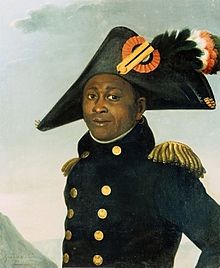François-Dominique Toussaint Louverture (French: [fʁɑ̃swa dɔminik tusɛ̃ luvɛʁtyʁ], English: /ˌluːvərˈtjʊər/) also known as Toussaint L'Ouverture or Toussaint Bréda (20 May 1743 – 7 April 1803), was a Haitian general and the most prominent leader of the Haitian Revolution. During his life, Louverture first fought and allied with Spanish forces against Saint-Domingue Royalists, then joined with Republican France, becoming Governor-General-for-life of Saint-Domingue, and lastly fought against Bonaparte's republican troops. As a revolutionary leader, Louverture displayed military and political acumen that helped transform the fledgling slave rebellion into a revolutionary movement. Along with Jean-Jacques Dessalines, Louverture is now known as one of the "Fathers of Haiti".
Toussaint Louverture was born as a slave in the French colony of Saint-Domingue, now known as Haiti. He was a devout Catholic, and was manumitted as an affranchi (ex-slave) before the French Revolution, identifying as a Creole for the greater part of his life. During his time as an affranchi, he became a salaried employee, an overseer of his former master's plantation, and later became a wealthy slave owner himself; Toussaint Louverture owned several coffee plantations at Petit Cormier, Grande Rivière, and Ennery. At the start of the Haitian revolution he was nearly 50 years old and began his military career as a lieutenant to Georges Biassou, an early leader of the 1791 War for Freedom in Saint-Domingue. Initially allied with the Spaniards of neighboring Santo Domingo, Louverture switched his allegiance to the French when the new Republican government abolished slavery. Louverture gradually established control over the whole island and used his political and military influence to gain dominance over his rivals. (Full article...)
